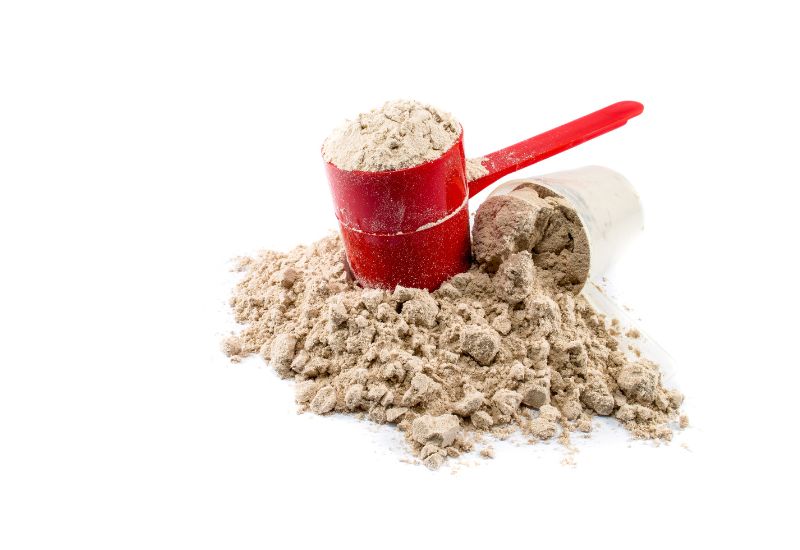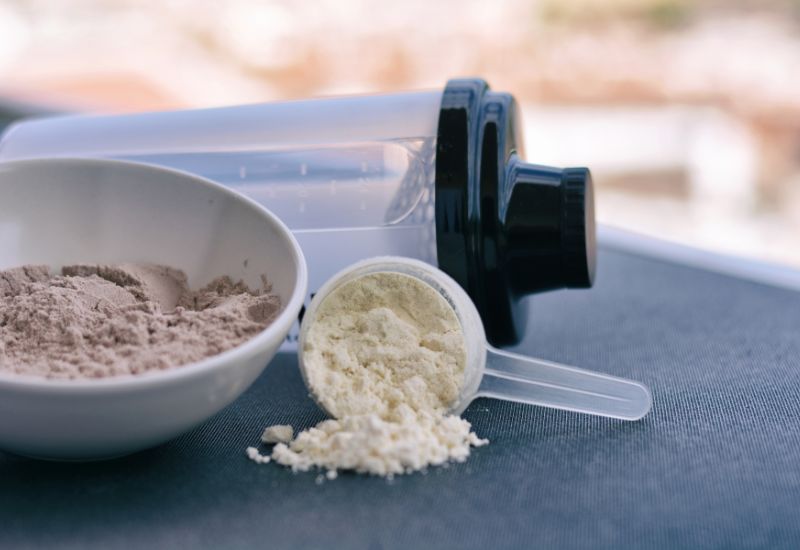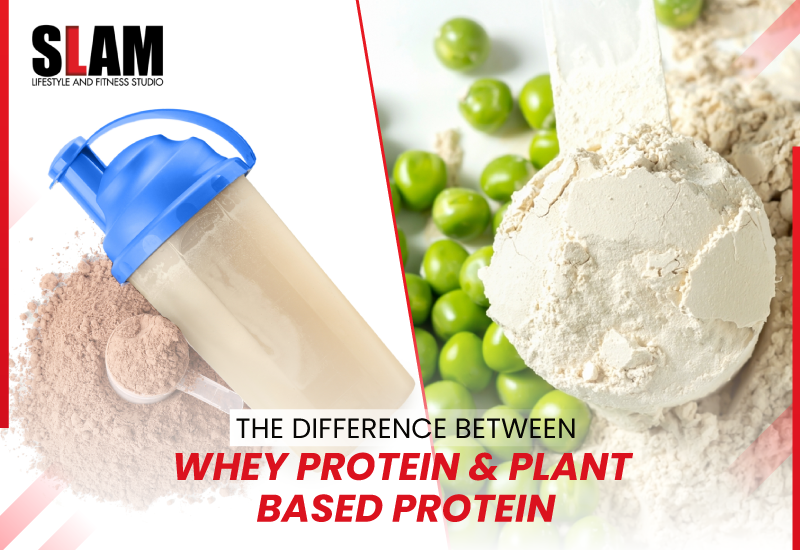Introduction
Protein is an essential nutrient for maintaining a healthy and active lifestyle. It is important for building and repairing muscle tissue and maintaining a healthy immune system.
When it comes to choosing a protein supplement, two popular options are whey protein and plant-based protein. Both protein powder types have unique benefits and drawbacks and it can be difficult to know which one is right for you.
In this blog post, we will take a detailed look at the difference between whey and plant based protein powder including their nutritional value, benefits and potential downsides. Whether you’re a fitness enthusiast looking to build muscle or someone simply looking to increase your protein intake, this article will help you decide which type of protein powder is right for you.
What is Whey protein powder?

Whey protein is a popular dietary supplement derived from a byproduct of cheese-making. It is a type of complete protein containing all of the essential amino acids the body needs to build and maintain muscle mass.
Some people may be allergic or intolerant to whey protein; in some cases it may cause gastrointestinal issues such as bloating and gas. It is recommended to start with a small dosage and monitor your body’s response to it. It is also important to speak with a healthcare professional before taking any dietary supplements especially if you have a pre-existing health condition.
Whey protein is a convenient and effective way to increase muscle mass and improve recovery after exercise. It is considered a safe dietary supplement in recommended dosages and under medical supervision.
What is Plant-based protein powder?

Plant-based protein powder is a dietary supplement made from various plant-based sources such as peas, rice, hemp, soy and other grains. It is a popular alternative to animal-based protein powders such as whey and casein as it is suitable for vegetarians, vegans and people with specific dietary restrictions. It is a good source of essential amino acids, fibre, vitamins and minerals.
These are considered complete proteins containing all the essential amino acids needed for muscle growth and repair. However, the amino acid profile of plant-based protein powders may not be as complete as animal-based protein powders. Some plant-based protein powders may be fortified with other amino acids to improve their nutritional profile.
Speaking with a healthcare professional before taking any dietary supplements is always recommended.
Comparison chart for Whey protein and Plant-based protein powder
| Whey Protein | Plant-based Protein |
| Derived from a byproduct of cheese-making | Derived from plants such as peas, rice, hemp, soy and other grains |
| Complete protein containing all essential amino acids | Typically considered a complete protein but the amino acid profile may not be as complete as animal-based protein |
| High bioavailability, easily absorbed and utilized by the body | Typically lower bioavailability than whey protein |
| Popular among athletes and bodybuilders for muscle building and recovery | Suitable for vegetarians, vegans and people with certain dietary restrictions |
| Can cause gastrointestinal issues such as bloating and gas for some people | Generally well-tolerated but some may contain allergens such as soy or nuts |
| Form available as concentrate, isolate and hydrolysate | Available in variety of options |
| Taste and texture may be preferred by some people | Taste and texture may vary and may be different from animal-based protein powders |
Protein content

Whey protein
One of the main benefits of whey protein is its high bioavailability, meaning that the body can easily absorb and utilize it. This makes it an ideal protein source for athletes, bodybuilders and anyone looking to increase muscle mass and improve recovery after exercise.
Whey protein powder is typically taken as a shake or smoothie mixed with water or milk. It can also be added to baked goods, oatmeal and other foods to boost the protein content. It’s also available in different forms like concentrate, isolate and hydrolysate.
The whey protein comprises several different protein fractions, including beta-lactoglobulin, alpha-lactalbumin and immunoglobulins. Each of these fractions has unique properties and benefits, which is why whey protein is considered one of the most effective types of protein for muscle building and recovery.
Plant-based protein
Plant-based protein powders can be used in a variety of ways including mixing them into shakes, smoothies and baked goods. They can also be used as a meat replacement in recipes such as veggie burgers and meatless meatballs. Some people may find the taste and texture of plant-based protein powders to be different from animal-based protein powders. But with the wide variety of options available, you can find the right one that suits your taste and needs.
Did you know?
Whey protein is the most popular type of protein powder, accounting for more than 60% of the global protein powder market.
Plant-based protein powder is the second most popular type of protein powder, accounting for around 30% of the global protein powder market.
Cost

Whey protein powder
The cost of Whey protein powder starts from ₹1500/- and goes upto ₹12,000/- depending on the ingredients, brand, etc.
Plant-Based protein powder
The cost of plant-based protein powder in India can vary depending on the brand and type of protein source used. On average, a 1 kg container of plant-based protein powder can range from about ₹1000/- to ₹3000/-.
However, the price can be higher or lower depending on the brand, ingredients and availability. It’s recommended to compare prices from different brands and sources to find the best deal.
How much it helps in muscle growth

Whey Protein
Whey protein is a convenient and effective way to increase muscle mass and improve recovery after exercise. It is considered a safe dietary supplement in recommended dosages and under medical supervision.
Plant-based protein
One of the main benefits of plant-based protein powders is that they are typically low in fat and cholesterol, making them a healthier option for people with certain dietary restrictions. They are also a good source of fibre, vitamins and minerals.
Conclusion
Both whey protein and plant-based protein are effective dietary supplements that can help to increase muscle mass and improve recovery after exercise.
It’s important to note that both types of protein have their own unique benefits and are useful for different people based on their dietary needs and preferences. Before starting to take any dietary supplements, it’s always recommended to speak with a healthcare professional to determine which type of protein is best for you.
FAQs
- How many protein scoops a day?
The recommended daily protein intake can vary depending on a person’s age, sex, weight, muscle mass and level of physical activity. The Recommended Dietary Allowance (RDA) for protein is 0.8 grams of protein per kilogram of body weight per day.
As for the number of protein scoops, it depends on the concentration of protein in the scoop and the brand; for example, a 30g scoop of whey protein powder typically contains around 24-25g of protein.
- When should I drink whey protein?
It is most effective when consumed within the “anabolic window,” which is the period of time immediately following exercise when your muscles are most receptive to nutrients. Consuming whey protein within this window can help to support muscle protein synthesis and promote recovery. However, it can also be consumed at other times of the day as part of a balanced diet.
- Does whey protein affect sperm?
There is limited research on the effects of whey protein on sperm but some studies suggest that high levels of whey protein intake may negatively affect sperm quality. It’s also important to keep in mind that a balanced diet that includes a variety of nutrients is important for overall health including reproductive health.
If you have concerns about the effects of whey protein on your sperm, it’s best to consult with a healthcare professional.
- Is it safe to take plant-based protein?
Plant-based protein sources such as those from soy, peas, lentils and beans are generally considered safe for most people.These protein sources can be a healthy alternative to animal-based proteins and be part of a balanced diet.
- Does plant-based protein affect your kidneys?
There is limited research on the effects of plant-based protein specifically on the kidneys but some studies suggest that high protein diets, in general, may have negative effects on kidney health in people with pre-existing kidney disease.
A high protein diet, whether from animal or plant sources may increase the workload on the kidneys and lead to an increase in the number of waste products produced by the body that the kidneys need to filter. This can potentially cause damage to the kidneys over time. For this reason, people with pre-existing kidney disease or those who are at risk for kidney disease should be mindful of their protein intake and may need to limit the amount of protein in their diet.



